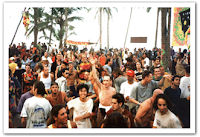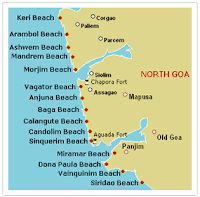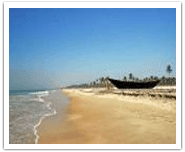Travel Goa:
By any standard, Goa is one of the greatest tropical destinations in the world. In order to maximize your time discovering beautiful Goa India, it is important that you are well informed and prepared before and after you get here. Most of those little details you may need including answers to some of the questions that you may have are listed in this section for your convenience.
Visa
Travel Goa
Everyone needs a visa for India and it must be obtained before you enter the country.Six-month multiple-entry visas (valid from the date of issue) are issued to most nationalities regardless of whether you intend staying that long or are re-entering the country. Visa applications can be made at your nearest embassy or consulate in person or by post. You need to provide a completed visa application form, passport photographs, visa fee and, in some cases, an itinerary and proof of onward travel (such as a flight ticket out of India). Check with your embassy for specific requirements. Many embassies have a website where you can download and print a visa application form and get all the information you need.
Visa fees vary from country to country.
Travel Insurance
Travel Goa
A travel insurance policy to cover theft, loss and medical problems is definitely a wise idea. There is a wide variety of policies and your travel agent will have recommendations. Some policies specifically exclude 'dangerous activities', which can mean motorcycling, and even trekking. This is especially relevant in Goa, where most people hire a scooter or motorcycle at some time. Other increasingly popular activities in Goa are scuba diving and water sports such as water-skiing and paragliding, all of which may require special stipulations when you take out your travel insurance.
Driving Licence & PermitsTravel Goa
If you are considering hiring a car or motorcycle in Goa (as many do), get an international driving permit. While not essential in Goa, the permit will certainly keep you out of trouble if you're stopped by traffic police in Goa India. Contact the automobile association in your own country to get one - obviously you need a valid driving licence to be eligible for it.
Document Copies
Travel Goa
All important documents, (eg. passport data and visa pages, credit cards, travel insurance policy, air/bus/train tickets, driving licence) should be photocopied before you leave home. Leave one copy with someone at home and keep another with you, separate from the originals. It's also a good idea to store details of your vital travel documents in your email address.
Health in GoaHealth facilities are good in the cities and chemists and hospitals are available in larger towns and villages. Local English speaking doctors can be contacted through your hotel or company representative. Standards of sanitation in Goa are generally high, however a few common-sense precautions are in order.
Be wary of food that may have to be reheated. Anything boiled, fried or grilled is usually all right. Raw, unpeeled fruit and vegetables should always be suspected and salads avoided. Bottled water is readily available, titlehough not all bottled water is mineral water and care should be taken when ordering.
Vaccinations
There is no legal requirement for entry to Goa, but meningitis, typhoid and hepatitis A jabs are recommended. It is also advisable to ensure you are up to date with tetanus, polio and other boosters. If you have any concerns your local GP will be happy to give you more advice.
Malaria Incidence in Goa is relatively small, but it is advisable to take precautions. Take preventative tablets covering the period before and after your trip. It is best to carry a good supply of DEET-based repellent cream/spray. In India ODOMOS cream/lotion is easily available.
Bites and Stings
At night, use mosquito nets and insect repellents to avoid mosquito bites and guard against both malaria and dengue fever. It’s also a good idea to shut all your windows just before dusk, which is when mosquitoes are most likely to enter your room.
You’re unlikely to come across snakes and scorpions, as they’re more scared of you than you are of them, but to be on the safe side don’t let your children play in long grass. Even what appear to be the tamest of animals can give nasty bites, so steer clear of unknown dogs, as rabies is sometimes found among stray or wild ones.
Children Safety in GoaChildren of any age are widely welcomed in India. The only problem for them, especially small ones, is that they are vulnerable and need extra protection from the sun, unsafe drinking water, heat and unfamiliar foods. Rehydration stitles are vital if your child goes down with diarrhoea. It is advisable to ensure that your children are aware of the dangers of rabies and keep away from animals.
Getting Around in GoaBuses are by far the cheapest way to travel in Goa - they’re usually overcrowded, and rarely seem to follow any particular schedule, but they’re fine for short trips. For longer trips, Goa’s new national railway system will take you around the region and even as far as Bombay - but you may need to book well in advance.
Black and yellow taxis run from official government ranks and have fixed prices; white taxis tend to be based outside hotels and restaurants, but they don’t always have set prices so it’s a good idea to agree a fare with them before you set off.
If you want to do a lot of travelling in a short period of time, it may be cheaper and more convenient to hire a private taxi for a day or half-day.
India's roads can be hazardous due to a combination of poorly maintained vehicles and bad drivers. If you do decide to hire a car please do so with caution, and take care at night, as many buses, lorries and bullock carts are unlit and not easy to spot in the dark.
On Goa Beach
Although Goa’s clear, warm seas are among the most inviting for swimming anywhere in the world, you’ll need to beware of strong under-currents at certain times of the year, especially in the weeks after the monsoons, normally towards the end of September. Don’t try to swim at all during the monsoon season.
Topless bathing is not officially allowed, and nudism is not permitted anywhere. It’s best not to wear swimwear or short shorts in town, to avoid offending the locals.
If a jellyfish stings you, treat the sting with an acid solution such as vinegar or urine, and then immerse the area in water as hot as you can stand; to break down the toxins.
Scorpion fish and lionfish are more dangerous than jellyfish, but you’re less likely to come across these on sandy beaches, as they prefer rocky areas. If you do step on one, treat the sting with hot water, and then see a doctor (G.P.).
If you take food and drink to the beach with you, please take the rubbish back to your hotel to dispose of it. And titlehough you’ll need to drink plenty of bottled water, do remember to bin the empties instead of leaving them on the beach.
Money
Currency
Travel Goa
The Currency Unit in Goa as in the rest of India is the Indian Rupee. Each rupee consists of 100 paise. Currency notes are issued in the denominations of Rs. 1000, Rs. 500, Rs. 100, Rs. 50, Rs. 20, Rs. 10, Rs. 5, Rs. 2, Re. 1. Coins issued are of Rs. 5, Rs. 2, Re. 1, 50 paise, 25 paise, 10 paise denominations.
However you will rarely find the following in circulation: Notes of Rs. 2, Re. 1 and coins of 20 paise, 10 paise, 5 paise. Notes of Rs. 500 and Rs. 100 are quite similar in appearance and hence easy to confuse, so always take care while accepting or handing out notes of these denominations.
Travellers ChequesTravel Goa
All major brands are accepted in India, with American Express (AmEx) and Thomas Cook being the most widely traded. Pounds sterling, euros and US dollars are the safest bet. Charges for changing travllers cheques vary from place to place and bank to bank, but hot competition among private moneychangers means you can usually change cheques commission-free.
ATMs
Travel Goa
Several banks have introduced 24-hour ATMS into Goa and there are more opening each year. These take international cards using the Cirrus, Maestro, Master Card and Visa networks. The main banks with ATMs are ICICI, Centurion, HDFC and UTI. In most cases the ATMs are not actually attached to a bank branch but are installed in shopping areas purely as cash-dispensing machines. They are usually in an air-conditioned cubicle (which you may need your card to access) and are guarded by 24-hour armed security.
Credit Cards
Travel Goa
These are accepted in most major tourist centres, but don't expect to be able to use a card in budget hotels and restaurants. Upmarket hotels accept them, as do most travel agencies and practically all department stores. MasterCard and Visa are the most widely accepted cards. Cash advances on credit cards can be made at branches of Thomas Cook.
Communications Telephone
Travel Goa
The area code for all places within the state of Goa is 0832, which you only need to dial when calling from outside the state or from a mobile phone. All over Goa, even in the smallest places you'll find private STD/ISD call booths that have direct local, interstate and international dialing.
Mobile PhonesTravel Goa
These have been embraced with a passion in India, and if you intend to spend some time in Goa it may be worth getting hooked up to the local network. Call costs - even international calls - are relatively cheap in India and having a mobile phone means you can easily be contacted at any time, and make calls if you need to. You can bring your own handset and instantly get connected to a prepaid account on one of the local networks.
Faxes
Travel Goa
Faxes can also be sent from many telephone offices.
Email & Internet Access
Travel Goa
Internet and email services in Goa are plentiful, reliable and relatively cheap. In all major towns, beach resorts from Arambol to Palolem, and even some small villages, you'll easily find somewhere to check email. The most common places offering Internet access are travel agencies and STD/ISD phone offices, but you'll also find a few dedicated Internet cafes. Many hotels and guesthouses also offer Internet access for guests.
Electricity
The electric current is 230V to 240V. Plugs have three round pins - similar to some European plugs. Power cuts are frequent occurrences, usually lasting for just a few minutes upto a couple of hours.
Few points to rememberAvoid heat stroke and sunburn by staying out of the sun during the hottest times of the day. Wear loose, comfortable clothes in natural fibers, and always use a good sunscreen.
Steer clear of hiring mopeds and motorbikes, and take great care if you decide to hire a car - India has the worst road safety record in the world.
Don’t leave valuables such as your passport, tickets, money and traveler’s cheques in your hotel room - ideally put them in the hotel safe or a safety deposit box.
Watch what you eat and drink - avoid uncooked or reheated food, peel fruit before eating it, and only drink bottled water.
Government offices are open from 10am to 5pm on Monday to Friday, and on Saturday morning.
Banks are open 10am to 2pm Monday to Friday, and 10am to noon on Saturdays.
Labels: 4:TIPS FOR VISITORS


 From bamboo huts beneath shady beach palms to spectacular five-star resorts with lobbies the size of an airport departure lounge and lush nine-hole golf courses.
From bamboo huts beneath shady beach palms to spectacular five-star resorts with lobbies the size of an airport departure lounge and lush nine-hole golf courses.















 More than 36 beautiful Goa Beaches are waiting for your footprints...
More than 36 beautiful Goa Beaches are waiting for your footprints... If variety is what you are looking for don't look any further. Each Goa Beach has an individuality of its own.
If variety is what you are looking for don't look any further. Each Goa Beach has an individuality of its own. Goa is a real paradise for you, to enjoy the sea or just to soak up the sun.
Goa is a real paradise for you, to enjoy the sea or just to soak up the sun. Beaches in Goa are usually named for the closest village.
Beaches in Goa are usually named for the closest village.


 Baga Beach - 15 km (9 miles) northwest of Panaji
Baga Beach - 15 km (9 miles) northwest of Panaji

 Candolim beach is situated in the north of Goa and lies close to the Sinquerim beach. Candolim beach comes as an ideal beach for those who are slowly getting tired of the crowded beaches of Calangute or Anjuna. Though tourists quite often frequent Candolim beach, you can still find some quiet places for yourself. Candolim beach offers a variety of sports activites, right from parasailing to water-sking. There are special guides to help you through these daring water sports activites.
Candolim beach is situated in the north of Goa and lies close to the Sinquerim beach. Candolim beach comes as an ideal beach for those who are slowly getting tired of the crowded beaches of Calangute or Anjuna. Though tourists quite often frequent Candolim beach, you can still find some quiet places for yourself. Candolim beach offers a variety of sports activites, right from parasailing to water-sking. There are special guides to help you through these daring water sports activites.


 Consaulim Goa Beach - 10 km (6.2 mi) northwest of Madgaon
Consaulim Goa Beach - 10 km (6.2 mi) northwest of Madgaon


 Agonda beach is an almost completely untoched 2km stretch of white sand. It's a great place to chill out if you're feeling mellow and have a stack of good books, but don't come here if you like to spend your afternoons playing beach volleyball and boozing in the beach shacks - with the exception of a couple of restaurants attached to guesthouses, there are none.
Agonda beach is an almost completely untoched 2km stretch of white sand. It's a great place to chill out if you're feeling mellow and have a stack of good books, but don't come here if you like to spend your afternoons playing beach volleyball and boozing in the beach shacks - with the exception of a couple of restaurants attached to guesthouses, there are none. Palolem is the beach of Goa's southernmost town, Canacona, locally called Chaudi. It is one of the most beautiful beaches in Goa; a shallow bay fringed with white sands and coconut palms, with the village right behind it. At the northern end is a tiny island which you can wade out to at low tide. The hillside beyond is thickly forested. South of Palolem is the Colomb-Patnem Beach.
Palolem is the beach of Goa's southernmost town, Canacona, locally called Chaudi. It is one of the most beautiful beaches in Goa; a shallow bay fringed with white sands and coconut palms, with the village right behind it. At the northern end is a tiny island which you can wade out to at low tide. The hillside beyond is thickly forested. South of Palolem is the Colomb-Patnem Beach. Velsao Beach
Velsao Beach